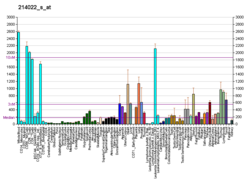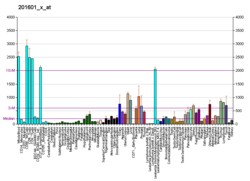IFITM1 (IFITM1)
IFITM1 (англ. Interferon-induced transmembrane protein 1; CD225) — мембранный белок из семейства интерферон-индуцируемых мембранных белков, продукт гена человека IFITM1[3][4].
У человека семейство IFITM представлено 4 генами 11-й хромосомы: IFITM1, IFITM2, IFITM3 и IFITM5[5]. У мыши в семейство входят 7 белков (есть также IFITM6 и IFITM7).
Функции
[править | править код]IFITM1, как и другие члены этого семейства, является антивирусным белком, который ингибирует вход вируса в клеточную цитоплазму. Белок не влияет на эндоцитоз вируса, но предотвращает последующее слияние и высвобождение вируса в цитоплазму. Активен против вируса гриппа A, коронавираса SARS, вируса Марбург, вируса Эбола, вируса лихорадки денге, вируса лихорадки Западного Нила, ВИЧ-1 и вируса гепатита C.
Кроме антивирусной активности участвует в контроле клеточного роста и миграции. Играет ключевую роль в антипролиферативном действии интерферона-гамма за счёт p53-зависимого ингибирования активности ERK и задержки клеточного роста в G1-фазе. Действует как положительный регулятор дифференцировки остеобластов.
Примечания
[править | править код]- ↑ 1 2 3 GRCh38: Ensembl release 89: ENSG00000185885 - Ensembl, May 2017
- ↑ Ссылка на публикацию человека на PubMed: Национальный центр биотехнологической информации, Национальная медицинская библиотека США.
- ↑ Deblandre G.A., Marinx O.P., Evans S.S., Majjaj S., Leo O., Caput D., Huez G.A., Wathelet M.G. Expression cloning of an interferon-inducible 17-kDa membrane protein implicated in the control of cell growth (англ.) // J Biol Chem : journal. — 1995. — November (vol. 270, no. 40). — P. 23860—23866. — doi:10.1074/jbc.270.40.23860. — PMID 7559564.
- ↑ Entrez Gene: IFITM1 interferon induced transmembrane protein 1 (9-27).
- ↑ Hickford D., Frankenberg S., Shaw G., Renfree M.B. Evolution of vertebrate interferon inducible transmembrane proteins (англ.) // BMC Genomics[англ.] : journal. — 2012. — Vol. 13. — P. 155. — doi:10.1186/1471-2164-13-155. — PMID 22537233. — PMC 3424830.
Литература
[править | править код]- Bradbury L.E., Kansas G.S., Levy S., etal. The CD19/CD21 signal transducing complex of human B lymphocytes includes the target of antiproliferative antibody-1 and Leu-13 molecules. (англ.) // J. Immunol. : journal. — 1992. — Vol. 149, no. 9. — P. 2841—2850. — PMID 1383329.
- Takahashi S., Doss C., Levy S., Levy R. TAPA-1, the target of an antiproliferative antibody, is associated on the cell surface with the Leu-13 antigen. (англ.) // J. Immunol. : journal. — 1990. — Vol. 145, no. 7. — P. 2207—2213. — PMID 2398277.
- Reid L.E., Brasnett A.H., Gilbert C.S., etal. A single DNA response element can confer inducibility by both alpha- and gamma-interferons. (англ.) // Proceedings of the National Academy of Sciences of the United States of America : journal. — 1989. — Vol. 86, no. 3. — P. 840—844. — doi:10.1073/pnas.86.3.840. — PMID 2492664. — PMC 286573.
- Kelly J.M., Gilbert C.S., Stark G.R., Kerr I.M. Differential regulation of interferon-induced mRNAs and c-myc mRNA by alpha- and gamma-interferons. (англ.) // Eur. J. Biochem.[англ.] : journal. — 1986. — Vol. 153, no. 2. — P. 367—371. — doi:10.1111/j.1432-1033.1985.tb09312.x. — PMID 3935435.
- Friedman R.L., Manly S.P., McMahon M., etal. Transcriptional and posttranscriptional regulation of interferon-induced gene expression in human cells. (англ.) // Cell : journal. — Cell Press, 1984. — Vol. 38, no. 3. — P. 745—755. — doi:10.1016/0092-8674(84)90270-8. — PMID 6548414.
- Strausberg R.L., Feingold E.A., Grouse L.H., etal. Generation and initial analysis of more than 15,000 full-length human and mouse cDNA sequences. (англ.) // Proceedings of the National Academy of Sciences of the United States of America : journal. — 2003. — Vol. 99, no. 26. — P. 16899—16903. — doi:10.1073/pnas.242603899. — PMID 12477932. — PMC 139241.
- Kita K., Sugaya S., Zhai L., etal. Involvement of LEU13 in interferon-induced refractoriness of human RSa cells to cell killing by X rays. (англ.) // Radiat. Res.[англ.] : journal. — 2003. — Vol. 160, no. 3. — P. 302—308. — doi:10.1667/RR3039. — PMID 12926988.
- Lehner B., Semple J.I., Brown S.E., etal. Analysis of a high-throughput yeast two-hybrid system and its use to predict the function of intracellular proteins encoded within the human MHC class III region. (англ.) // Genomics : journal. — Academic Press, 2004. — Vol. 83, no. 1. — P. 153—167. — doi:10.1016/S0888-7543(03)00235-0. — PMID 14667819.
- Gerhard D.S., Wagner L., Feingold E.A., etal. The status, quality, and expansion of the NIH full-length cDNA project: the Mammalian Gene Collection (MGC). (англ.) // Genome Res. : journal. — 2004. — Vol. 14, no. 10B. — P. 2121—2127. — doi:10.1101/gr.2596504. — PMID 15489334. — PMC 528928.
- Akyerli C.B., Beksac M., Holko M., etal. Expression of IFITM1 in chronic myeloid leukemia patients. (англ.) // Leuk. Res.[англ.] : journal. — 2005. — Vol. 29, no. 3. — P. 283—286. — doi:10.1016/j.leukres.2004.07.007. — PMID 15661263.
- Yang Y., Lee J.H., Kim K.Y., etal. The interferon-inducible 9-27 gene modulates the susceptibility to natural killer cells and the invasiveness of gastric cancer cells. (англ.) // Cancer Lett.[англ.] : journal. — 2005. — Vol. 221, no. 2. — P. 191—200. — doi:10.1016/j.canlet.2004.08.022. — PMID 15808405.
- Rual J.F., Venkatesan K., Hao T., etal. Towards a proteome-scale map of the human protein-protein interaction network. (англ.) // Nature : journal. — 2005. — Vol. 437, no. 7062. — P. 1173—1178. — doi:10.1038/nature04209. — PMID 16189514.



